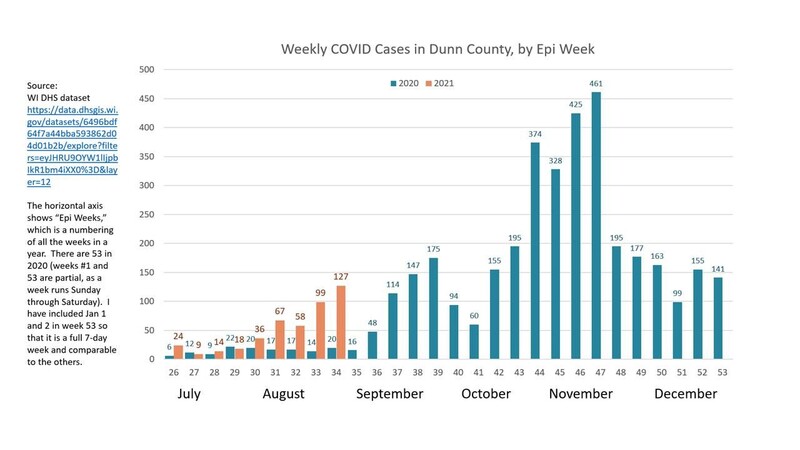Then & Now, Dunn County edition: We are currently far above the levels of COVID we were seeing last year at this time. Many things have changed since last year, in ways that could make a fall surge better or worse than before. And, as with all things COVID, our predictions are often likely to not come true - the factors are so complicated and there is still much to learn. But it's useful to consider: Things that are better now vs. last September: People are vaccinated. Only 41% of our county, but that should definitely help decrease hospitalization rates, especially as more than 76% of our age 65+ folks are fully vaccinated. This will result in fewer hospitalizations overall IF total numbers of cases are similar to last year. Unfortunately, vaccination isn't as protective against getting infected and becoming contagious as it was pre-Delta. But it still helps with that some.Some people have natural immunity from a previous infection. Although this is less reliable than vaccination, it can still be quite helpful in many people in preventing infection and severe illness. Things that are worse now: The Delta variant is more contagious. Instead of the average person infecting 2 other people like last fall, it's now about 5-8. This means that things can escalate very quickly. Delta has a shorter incubation period - instead of 3-10 days from exposure to when you are contagious to others, it's now about 2-5. That's less time for contact tracing to occur and to get exposed people into quarantine so that they don't accidentally infect others. There's no way our public health folks can keep up with this - we don't have the infrastructure. Early data suggests that Delta is more severe and is twice as likely as OG COVID to result in hospitalization.People are tired of COVID. They are much less likely to wear masks and avoid gatherings. Large indoor events are being held, often with no mask requirement. People are also less likely to get tested and to isolate and quarantine, which means they're more likely to be out and about and potentially infecting others. Our mitigation measures are falling apart at the community level. Our K-12 schools are not requiring masks. Data on Delta shows that children can and do get infected and transmit it to others quite easily, unlike with OG COVID. Stout will have full classrooms this fall (no physical distancing) as well as in-person campus events. (But they are still requiring masks and testing every two weeks for unvaccinated students and staff.) Who knows what will actually happen. But the odds do not appear to be in our favor for anything other than a very large surge in cases over the next weeks to months. The key factor will be how many of those cases result in severe illness, which can then overwhelm medical capacity / hospitals and result in unnecessary deaths and suffering due to lack of access to appropriate care.The other huge impact on people's lives will be missed work and school due to isolation and/or quarantine. This can have an enormous impact on area businesses, services, and schools. The UK and Hawaii both have recently had trouble keeping food stocked on grocery shelves due to shortages of workers for everything from transport to cashier. If a large number of teachers need to be out to care for infected or quarantined young children at home, then some classes/grades/schools may not be able to operate, thus requiring more parents to stay at home and miss work to care for their children who cannot then go to school for lack of teachers.Be ready. Hopefully it won't come to any of this. But be ready, just in case.
Memberships
Alexandra Hall M.D. – Dr. Hall earned a Bachelor’s of Science in Science Education from New York University, taught high school in East Harlem, and then earned her M.D. from Mount Sinai School of Medicine.
She then completed a residency in Family Practice and served as Chief Resident at the University of Vermont. After practicing medicine for Dean Health System in Wisconsin and then at Cornell University in Ithaca, NY, Dr. Hall moved to Menomonie, WI to work at UW Stout, where she currently teaches for the Biology department and serves as a physician at Student Health Services.
Dr. Hall has a passion for educating people about health and science; she gives workshops regionally and nationally on various medical topics to both lay and professional audiences and has won several teaching awards for her work.



Add new comment